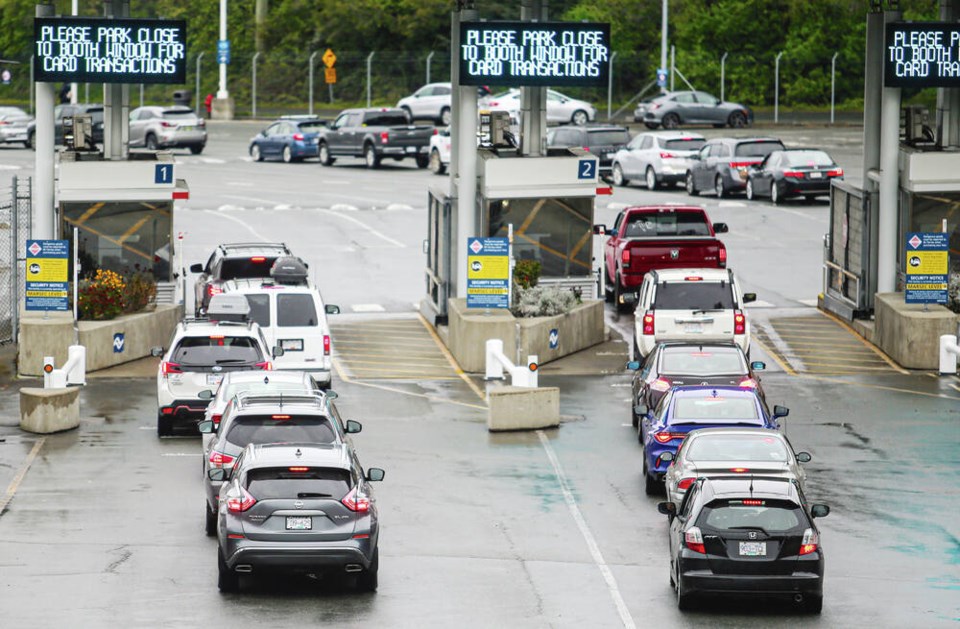B.C. Ferries will see a wave of workers quitting unless it reopens its collective agreement to increase wages as prices rise, says the president of the union representing employees.
At a meeting in Vancouver last week, members were “loud and clear” that they need an increase in wages, said Eric McNeely, president of the B.C. Ferry and Marine Workers Union.
“They are working massive amounts of overtime just to subsidize their income because the wages are too low. It’s not sustainable.”
Pay for some unionized ferry workers is falling behind what they could be earning in other marine-oriented businesses, or from employers outside the marine sector who hire staff with similar skills, he said.
It can be 20 to 40 per cent below other employers, said McNeely. He said he travelled around the fleet to meet with members on board vessels and working on land to discuss wage comparisons.
B.C. Ferries, which has 39 vessels serving 25 routes, employs 4,500 people during peak seasons. Jobs range from seasonal and casual to permanent.
Up to one-quarter of the workforce can be working as casual employees in busy times, McNeely said.
Wages vary depending on the job — a casual clerk would earn about $24 per hour, while there is a current opening for a chief officer working full time on Salt Spring for $48.32 an hour.
The current contract runs from November 2020 to Oct. 31, 2025. It included a two per cent increase in 2022 and again in 2023, but contains terms allowing wage talks to reopen in April 2024 and again in April 2025.
Members have said they can’t wait until 2024 and will start looking elsewhere, McNeely said, adding more departures will mean remaining staff face a heavier workload. “That’s the exact opposite of what we are looking for.”
The union has discussed with B.C. Ferries the “significant differences between the wages and the market,” he said.
The company’s September report for the B.C. Ferries Commissioner recommends working with the union to pilot different hours of work and shift schedules with the aim of reducing pressure at work, cutting back on unplanned overtime and improving work-life balance.
McNeely said he is optimistic about initiatives to recruit and keep staff. “So we are encouraged by that, but we think long-term might be too long. There’s probably some short-term action that needs to be taken to retain and recruit.”
Crew shortages have led to more than 730 cancelled sailings between October 2021 and the end of June this year.
One of the latest examples happened on Friday, when B.C. Ferries announced that the Queen of Capilano’s sailings between Bowen Island and Horseshoe Bay were cancelled because of a shortage of crew members. Two water taxis were brought into service.
For the 2023 fiscal year, voluntary turnover among employees on vessels and at terminals is expected to be three times historical averages, from four to 12 per cent, the B.C. Ferries report said.
To prevent the loss of workers, the company is rolling out a new human resources strategy with short-term and long-term initiatives and objectives.
“We are working on a variety of human resource strategies as we become a more people-centric organization,” B.C. Ferries spokesperson Deborah Marshall said.
As for the call to reopen the contract, Marshall said B.C. Ferries meets with the B.C. Ferry & Marine Workers’ Union regularly to discuss a variety of issues, including ways to engage and retain employees.
“When it comes to items that fall within the collective agreement, there’s a negotiation process that governs the two parties. B.C. Ferries does not bargain through the media.”
The company said in its report that efforts to hire staff will remain “elevated” because of the current competitive hiring market, retirements, staff health concerns, job changes and lack of affordable housing.
Higher-than-usual absenteeism is partly because of illness due to the pandemic, and the requirement for employees with COVID symptoms to stay off work for longer periods, the report said.
Overtime has soared to “excessive and unsustainable” levels — the current trend is about 50 per cent higher than in the past, it said — contributing to employee fatigue and resulting in additional costs, it said.
B.C. Ferries says in the report that to attract and retain a high-calibre workforce, it aims to provide competitive rewards and provide meaningful work with a work-life balance.
>>> To comment on this article, write a letter to the editor: [email protected]



